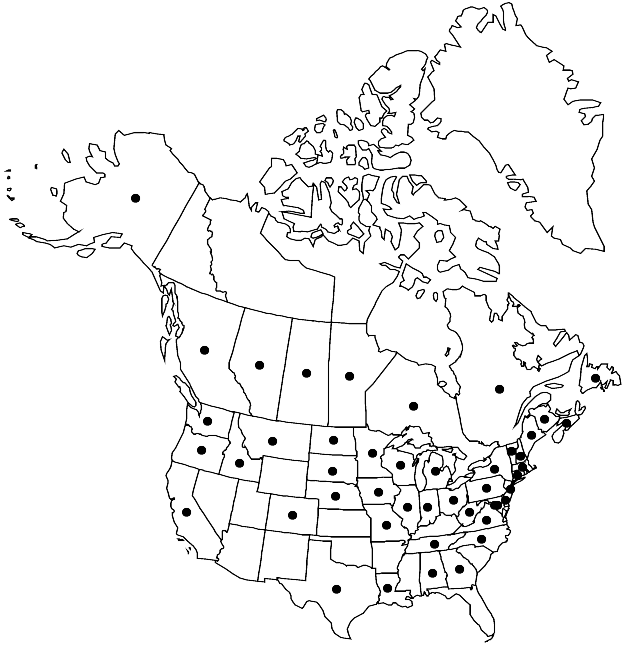Difference between revisions of "Leskea polycarpa"
Sp. Musc. Frond., 225. 1801.
FNA>Volume Importer |
FNA>Volume Importer |
(No difference)
| |
Revision as of 22:03, 16 December 2019
Plants pale green or brownish. Stems with branches spreading, loosely foliate, somewhat curved at apices. Stem and branch leaves differentiated. Stem leaves distinctly longer than broad, 0.8–1.2 mm; apex somewhat obliquely acuminate and subsecund. Branch leaves remote to ± crowded, ovate-lanceolate, not or slightly plicate, 0.5–0.8 mm; margins plane to somewhat recurved proximally; apex blunt or acute, usually somewhat oblique and subsecund; costa ending near apex; distal laminal cells 7–9 µm, papillose abaxially. Seta orange-brown to red, 0.7–1.2 cm. Capsule brown to yellow-brown, subcylindric, curved, 2–3 mm; annulus 2 (or 3)-seriate; operculum short to occasionally long-conic; exostome teeth yellowish to brownish yellow; endostome segments somewhat shorter than exostome teeth. Spores 9–13 µm, very finely papillose or nearly smooth.
Phenology: Capsules mature Mar–Nov.
Habitat: Base and lower trunks of hardwood and coniferous trees, soil around tree bases, logs, rock, low areas near streams and creeks, roofs
Elevation: low to moderate elevations (10-1100 m)
Distribution

Alta., B.C., Man., N.B., Nfld. and Labr. (Nfld.), N.S., Ont., Que., Sask., Ala., Alaska, Calif., Colo., Conn., Del., D.C., Ga., Idaho, Ill., Ind., Iowa, La., Maine, Md., Mass., Mich., Minn., Mo., Mont., Nebr., N.H., N.J., N.Y., N.C., N.Dak., Ohio, Oreg., Pa., S.Dak., Tenn., Tex., Vt., Va., Wash., W.Va., Wis., Europe, Asia, Africa.
Discussion
Leskea polycarpa is distinguished by branches typically curved at the apices, clearly differentiated stem leaves that are distinctly longer than wide and somewhat oblique and subsecund at the apices, and capsules that are subcylindric and curved.
Leskea angustata Taylor
Leskea angustata was cited for the flora area by L. E. Anderson et al. (1990). However, no voucher specimens or other literature citations of L. angustata for the area have been seen; it is consequently excluded from this treatment.
Selected References
None.